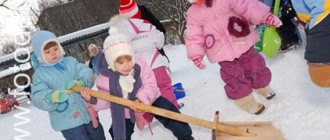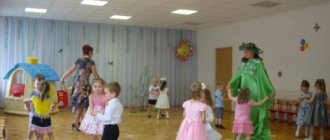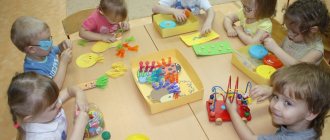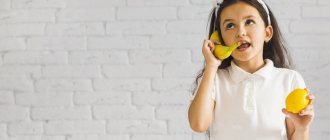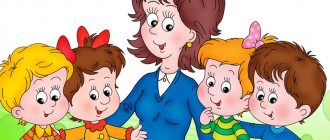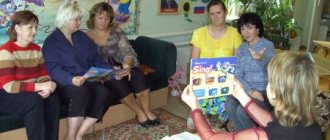Article “New approaches to interaction with the family of preschool children within the framework of the Federal State Educational Standard”
Leisure forms of organizing communication are designed to establish warm informal relationships between teachers and parents, as well as more trusting relationships between parents and children (joint holidays and leisure activities). Leisure forms of cooperation with the family can only be effective if educators pay sufficient attention to the pedagogical content of the event.
Cognitive forms of organizing communication between teachers and families are intended to familiarize parents with the characteristics of the age and psychological development of children, rational methods and techniques of education for the formation of practical skills in parents.
The main role continues to belong to such collective forms of communication as meetings, group consultations, etc. The principles on the basis of which communication between teachers and parents are based have changed. These include communication based on dialogue, openness, sincerity in communication, refusal to criticize and evaluate the communication partner.
Cognitive forms of organizing communication between teachers and parents are designed to play a dominant role in improving the psychological and pedagogical culture of parents, and therefore contribute to changing the views of parents on raising a child in a family environment, and develop reflection.
Visual and informational forms of organizing communication between teachers and parents solve the problem of familiarizing parents with the conditions, content and methods of raising children in a preschool educational institution, allow them to more correctly evaluate the activities of teachers, revise the methods and techniques of home education, and see more objectively the activities of the teacher. Visual information forms are conventionally divided into two subgroups. Familiarizing parents with the preschool educational institution, the features of its work, with teachers involved in raising children, and overcoming superficial opinions about the work of the preschool educational institution. The objectives of one of them - information and awareness-raising - is to familiarize parents with the preschool educational institution, the features of its functioning, the activities of teachers, etc. The tasks of the other group - information and education - are close to the tasks of cognitive forms and are aimed at enriching parents’ knowledge about the features of the development and upbringing of preschool children. Their specificity lies in the fact that the communication between teachers and parents here is not direct, but indirect - through newspapers, the organization of exhibitions, etc., therefore we have identified them as an independent subgroup, and not combined with cognitive forms.
“Open Days” are especially popular, during which parents can visit any group - this makes it possible to introduce parents to the preschool institution, its traditions, rules, features of educational work, to interest them in it and attract them to participate.
MAGAZINE Preschooler.RF
Form of cooperation between preschool educational institutions and families in the context of the Federal State Educational StandardIf a child grows up in an atmosphere of love and tenderness, although at times you show reasonable firmness, he will retain his friendly attitude towards people because it is inherent in his nature.
Benjamin Spock
This epigraph by an outstanding American psychologist, doctor, teacher expresses the whole essence of the interaction between the teacher and parents in a joint desire to help each child create an image of his “I” , that is, to acquire the necessary personal qualities during his stay in kindergarten, to form those psychological new formations that will help him successfully complete his course at school. And the first authority on a child’s path to life is the FAMILY.
The family is the primary source and model for the formation of a child’s interpersonal relationships; mom and dad are role models.
There is no other such institution, except the institution of the family, which so accurately predetermines the patterns of formation of the future person. Behind behavioral problems and the characteristics of children's relationships, adults are visible - their view of the world, their position, their behavioral stereotypes.
It is hardly possible for a child to develop harmoniously without the active participation of his parents. And, the main feature of family education is a special emotional climate, thanks to which the child develops an attitude towards himself, which determines his sense of self-worth.
Another important role of family education is the influence on the value orientations, worldview of the child as a whole, and his behavior in various spheres of public life. Practice has proven that it is the example of parents and their personal qualities that largely determine the effectiveness of the educational function of the family.
The importance of family education in the development of children determines the interaction between family and kindergarten. However, this interaction is influenced by a number of factors, most notably what parents and educators expect from each other. I believe that the main goal of all forms and types of interaction between a preschool educational institution and the FAMILY is to establish a trusting relationship between children, parents and educators, to unite into one team, to share their problems with each other and solve them together.
The sincere interest of adults - parents, teachers - at every moment of his life creates a good opportunity for the development of positive child-parent relationships.
“On Education” , which appeared in 1995, obliges teachers and parents to become not only equal, but also equally responsible participants in the educational process.
Parents, not having sufficient knowledge of the age and individual characteristics of the child’s development, sometimes carry out upbringing blindly, intuitively. All this, as a rule, does not bring positive results.
Many parents today, alas, tend to delegate the upbringing of their children to kindergarten, school, or the state, thereby causing irreparable damage to both the child, themselves, and society. It is not possible to raise a full-fledged personality without good family traditions, family warmth and comfort, and security. Article 18 of the Law of the Russian Federation “On Education” states: “Parents are the first teachers. They are obliged to lay the first foundations for the physical, moral and intellectual development of the child’s personality at an early age .
Family and kindergarten are two social institutions that stand at the origins
our future, but often they do not always have enough mutual understanding, tact, and patience to hear and understand each other.
Misunderstanding between family and kindergarten falls heavily on the child. It is no secret that many parents are only interested in their child’s nutrition and believe that kindergarten is a place where they only look after their children while parents are at work. And we, teachers, very often experience great difficulties in communicating with parents for this reason.
Over 10 years of teaching activity, I was convinced that the organization of a holistic pedagogical process, covering the educational influence of the child’s entire life as a whole, the entire system of his relationships with the reality around him, is possible only in interaction with parents, who, like the educator, must learn from children, how to raise them.
I believe that the first step in true cooperation between the teacher and parents in a joint search for forms, methods, means, is the creation of a normal psychological climate in kindergarten and at home, conducive to the formation and development of the pupil’s personal qualities.
What would a family want and learn to educate, because the example of parents is the basis of family education. What a child sees every day in the family, he will definitely transfer into adulthood, therefore, the main goal of my work is to involve the family in a single educational space.
And she set herself the need to solve the following problems:
- Work closely with the families of your students and promote active creative activity.
- To activate and enrich the educational skills of parents in creating favorable conditions and emotional comfort for the child surrounded by peers in kindergarten and all family members.
- Mastering by parents the psychological and pedagogical knowledge, skills and abilities necessary to create a favorable psychological climate in the family.
Having studied the literature on working with parents and the best practices of other teachers, I developed my own plan for working with parents.
4. I tried to include various forms of work with parents in the work plan. To begin with, I divided my work into 4 blocks:
1. visual and informational:
- newspaper release,
- open classes for parents,
- information stands,
- open days;
- vernissage,
- library
2. Information and analytical:
- survey,
- survey,
- "Mailbox";
3. Cognitive:
- pedagogical living rooms,
- parent clubs,
4. Leisure:
- holiday,
- participation of parents in competitions,
- Exhibitions.
This form of work as a “mailbox” allows parents (shy and indecisive) to share their thoughts, ideas and suggestions with educators and specialists through recording.
Questions asked are covered at parent-teacher meetings, or I pass
specialists in writing for individual meetings and consultations.
The newspaper is another form of working with parents.
Together with the parents, the group created a video and a photo library of children’s lives; the videos can be taken home to watch.
Very popular in our group is “Vernisage” , a stand that displays photographs, children’s essays, and products of collective children’s creativity.
In organizing a group library for parents and children, parents themselves are active participants. They created game and demonstration aids with their own hands and helped compile files of games, experiences, and experiments.
5. One of the most effective forms of work with families remains parent meetings, the purpose of which is to improve the pedagogical culture of parents, form a parent team, pedagogical education, and consultations, discussions, and family holidays.
The most popular and beloved, both for me and the children, and for the parents, is leisure. Here the possibilities of interaction for cooperation and manifestation of creativity of the family, children and teacher are most fully revealed. Experience has shown that parents are most willing to make contact and express a desire to cooperate with the kindergarten precisely when it comes directly to their child.
Together with parents and children, we organize photo exhibitions and exhibitions
children's and parent's work according to the seasons, holidays, etc.
It has become a tradition for the group to hold holidays and leisure activities where parents are direct participants. A special holiday is the New Year, where the main fairy-tale characters are parents. And after the holiday, a mandatory ritual is tea drinking.
Family and kindergarten have their own special functions and cannot replace each other. An important condition for continuity is the establishment of trusting business contact between the family and the kindergarten, during which the educational position of parents and teachers is adjusted, which is especially necessary when preparing children for school.
Links to sources
1. Grigorieva N., Kozlova L. How we work with parents // Preschool education. 2011. No. 9.
pp. 23-31
2. Danilina T. Modern problems of interaction between a preschool institution and the family // preschool education 2012. No. 1. – P. 41-49.
3. Doronova T.N. Interaction of a preschool institution with parents // Preschool education. 2012. No. 1. – P. 60-68.
4. Preschool institution and family - a single space for child development / T.N. Doronova, E.V. Solovyova, A.E. Zhichkina and others - M.: Linka-Press. – 2011. – P. 25-26.
5. Law of the Russian Federation “On Education” . – M.: Astrel Publishing House : AST Publishing House , 2013. – 78 p. – (Education in documents and comments).
6. Kozlova A.V., Desheulina R.P. Work of preschool educational institution with family. – M.: Sfera, 2014 – 112 p.
7. Leontyeva A., Lushpar T. Parents are the first teachers of their children // Preschool education. 2011. No. 8. – pp. 57-59.
Appendix: Celebrating Maslenitsa
MUNICIPAL BUDGET PRESCHOOL EDUCATIONAL INSTITUTION KINDERGARTEN "GOLDEN KEY" MUNICIPAL EDUCATION CITY NOYABRSK From the experience of the teacher Valentinna Maksimovna Revitskaya
| Next > |
Kindergarten and family: aspects of interaction in the context of the implementation of the Federal State Educational Standard for preschool education
Preschool childhood is a unique period in a person’s life when the foundation of his personality is laid. This is the period when a little person is completely dependent on the adults around him, primarily on his parents.
Pedagogical practice and scientific research data show that many families experience difficulties in raising children. Modern parents have a hard time due to lack of time, employment, lack of competence in matters of preschool pedagogy and psychology: they do not have sufficient knowledge of the age and individual characteristics of the child’s development, therefore they raise the child blindly, intuitively. Many parents try to solve the problem of their own insolvency by replacing the process of education with training in various development studios and centers.
Family and kindergarten are important institutions for the socialization of children. Their educational functions are different, but for the comprehensive development of the child’s personality, their interaction is necessary, built on the principle of interpenetration of two social institutions, and not on the principle of parallelism.
Therefore, there is a need to update an important area of activity of a preschool educational institution - the interaction of a teacher with the parents of students.
Involving parents in participating in the life of the kindergarten allows us to combine efforts for the development and upbringing of children and provide mutual assistance in solving emerging problems. When planning work with parents, we begin with an analysis of the social composition of parents, their mood and expectations of their child’s stay in kindergarten. Conducting surveys and personal conversations on this topic helps to properly organize work with parents, make it effective, and choose interesting forms of interaction with the family.
The task of the kindergarten is to recognize parents as full participants in educational relations and provide the family with pedagogical assistance, interest, and attract the family to its side in terms of uniform approaches to raising a child, revealing his capabilities and abilities.
A modern kindergarten today must quickly respond to changes occurring in society, the social composition of parents, their educational needs and requests, and be in a mode of development rather than functioning. Depending on this, the forms and themes of planned events with the family should change.
In our kindergarten “Smile”, many events are planned annually to improve the pedagogical competence of parents of pupils, strengthen family ties and harmonize parent-child relationships. We use both traditional and new forms of interaction between the team and the families of pupils: conversations and consultations, parent meetings, open days, joint leisure activities, matinees and concerts, open classes for parents, master classes, discussions. At the same time, the life of the child in kindergarten is revealed to parents, and preschool employees strive to involve them in the pedagogical process and make them participants in all ongoing events. Parents of students, when involved in the activities of the institution, as a rule, choose events in which they find answers to pressing questions for themselves.
The further development of the child depends on the joint work of parents and teachers. The most popular events attended by families are those that involve joint activities between parents and their children.
In September and April, open weeks are held in the kindergarten. These days, parents attend group events that allow them to clearly know and see how their child lives and develops, what new conditions are created and how comfortable they are for the child. While attending open classes, parents can observe the child in his usual environment, in the context of his real relationships with peers and the teacher. A parent has the opportunity to compare his child with peers and identify something previously unnoticed. Parents' involvement in the development of children's cognitive activity through experimental activities. The novelty of this form of work lies in creating motivation for the emergence of equal partnerships between a child and a parent in the process of conducting joint experiments aimed at increasing the cognitive interest of children. Our experience has shown that one of the effective forms of creating a trusting parent-teacher relationship is evenings of leisure with the active participation of parents. So in November we hold a holiday together with mothers, “Mom, my beloved!”, where a warm, sincere atmosphere reigns. In January “I love you Russia!”, February sports holidays “Merry Starts”, “Defender of the Fatherland Day”, “Maslenitsa”. In April there are “Holidays of Correct Speech”, in May the result of working with families in the preparatory group is the graduation party “Goodbye, Kindergarten”.
The most important way to implement cooperation with parents is to involve them in the event as active participants. Parents show ingenuity and imagination in various competitions, exhibitions, and festivals. They participate in the event as presenters, play musical instruments, tell interesting stories from their lives and much, much more.
Sometimes parents have problems that can be solved with the help of specialists. In this case, teachers come to their aid - specialists, psychologists who conduct debates and brain storms. In the process, the participants come to a common opinion. I would like to note that sometimes a new problem arises from the topic of discussion and parents propose to continue the debate in the future.
We conduct consultations and conversations every day during the reception of children and when the child goes home. Individual consultations with parents include questions about the dynamics of the child’s development (based on diagnostic results), his cognitive abilities and ways to correct them. We pay special attention to the organization of the developmental environment at home: we discuss in detail the details of the furnishings, the color scheme of dishes for eating and objects of cognitive activity, the choice of toys, educational games, books for viewing and reading, taking into account individual capabilities.
In addition to consultations, we also use other forms of work: visual and thematic corners for parents, exhibitions, stands designed in preschool educational institutions, we interest them in modern thematic information on issues of education, health, and safety of children. They include: reminders; booklets; newspapers and magazines covering the life of children in kindergarten, broadcasting the best experiences of family education, containing the headings: “This is interesting”, “Important to know”, etc.; educational routes for weekends, vacations, media library.
Due to the fact that kindergarten is a combined type, the main focus of work is speech correction. The problem of forming children's speech is relevant in our time. Many parents do not always know how to help their child. Parents often say: “We read so much to the child, told stories, taught poetry, explained, talked so much about everything, but there was no result: the child himself cannot describe the simplest picture, talk about anything, or answers questions in monosyllables... “How could it be otherwise: after all, it was the parents who told, talked, explained - and not the child!”
We were looking for different forms of working with parents to help specialists correct their children’s speech. We have repeatedly discussed this problem with parents and came to the conclusion that the most effective forms of work are seminars and workshops at which specialist teachers introduce parents to didactic material and non-traditional play methods of working with children to overcome speech problems.
Meetings on the topics: “Speech therapy classes at home”, “Speech at your fingertips”, “The art of being a parent” are very informative. Practical tasks for adults make it possible to teach them basic techniques of pedagogical interaction with a child, to involve parents in educational activities, and to interest them.
Consultations with teachers were and are carried out annually. The topics are very diverse: “Preschool educational institutions and parents. Ways of cooperation”, “Questioning as a method of studying the family of a preschooler. “Visual forms of working with parents”, “Communicative games with children and parents” “Formation of partnerships between teachers and parents in the conditions of cooperation of preschool educational institutions” and others.
We summarize the results of the implementation of educational programs at group parent meetings every year at the end of the school year in the form of dialogue: parents express not only their opinion on the organization of the educational process in the institution, but also their requests for the organization of educational services, including additional ones in the new academic year.
In conclusion, I would like to share the main result and value of our work: constant contact between kindergarten teachers and students’ parents ensures the latter’s sustained interest in the changes that are taking place in the development of their child. And also, children feel comfortable in kindergarten, since parents and teachers have mutual understanding and common requirements for children. This brings together and unites family members, parents increase the level of their psychological and pedagogical culture and, in my opinion, will contribute to the implementation of the requirements of the Federal State Educational Standard for Education.
Bibliography:
- Andreeva N.A., Ponomareva L.I. Interaction between preschool educational institutions and families in the interests of the development of the child’s personality // Program and practical guidance. Kurgan, 2004. 64 p.
- Andreeva NA Ways to increase the efficiency of interaction between family and preschool educational institutions // Materials of the interregional scientific and practical conference. Kurgan, 2000. pp. 21-24.
- Raising a preschooler in the family: (Issues of theory and methodology) / Ed. T.A. Markova.— M.: Pedagogy, 1979. 192 p.
- For educators about working with families: A manual for educators of children. garden (L.V. Zagik, T.A. Kulikova, T.A. Markova, etc.) / Ed. N.F. Vinogradova. M.: Education, 1989. 192 p.
